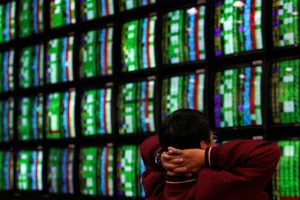(ATF) – Asian markets were reeling under selling pressure after Wall Street’s plunge overnight took the Dow Jones benchmark into bear territory with the S&P500 near the critical level. The Nikkei 225 tumbled by more than 3%, the Australian S&P ASX 200 plummeted 5.1% and South Korea’s Kospi benchmark had fallen 2.5%.
The selling was triggered after the World Health Organisation labeled the coronavirus a pandemic and following additional travel bans declared by the United States, as the infected cases globally exceeded 125,000 and the death count rose to 4,628.
US President Donald Trump suspended all travel from Europe, but exempted the United Kingdom from the ban, even as he pressed on with stimulus proposals which included tax reliefs and other targeted financial measures.
Overnight, the Dow Jones index fell 5.86%, down more than 20% from its recent peak, the definition of a bear market, while the S&P 500’s 4.89% plunge took the benchmark close to that mark.
Even as expectations swirl that the US Federal Reserve will cut another 50-75 bps next week and additional cuts are expected when the European Central Bank meets, these measures may be insufficient.
- READ MORE: Headline inflation eases to 5.2% in February
- READ MORE: China seeks to stabilize foreign trade, investment
“Rate cuts may also not be enough, with broad expectations that the central banks will re-introduce quantitative easing (QE) to address coronavirus inspired slowing growth and market volatility. A coordinated effort will also be considered after the G7 held a joint call last week,” said Marvin Loh, Global Macro Strategist at State Street Global Markets.
These hopes have soared after the collapse in oil prices following the breakdown in talks between Saudi Arabia and Russia which bludgeoned all inflation expectations.
“A long war between the two counties could keep oil prices suppressed longer than normal in these shock scenarios, which will also need to contend with falling demand in the face of the virus. With limited ammunition, central banks need to deal with multiple black swan events at the same time,” said Loh.
Britain’s twin-pronged approach to support its economy mildly boosted the pound after the government announced a US$39 billion fiscal stimulus plan on the heels of the Bank of England’s 50-basis point cut in the benchmark rate, which now stands at 0.25%.
Later in the day, data releases include China FDI, Australia inflation and Japan investments, although the focus will remain on fiscal and monetary steps by governments and central banks across the world.
























